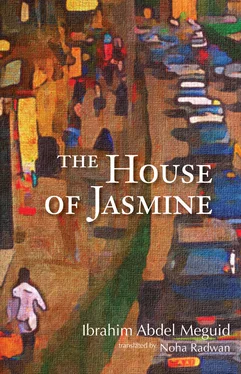#
It was past three o’clock when I stood in front of the entrance of Elite. I was covered with sweat and the weather was scorching. The noise and glitter of Safiyya Zaghlul Street disappointed me.
“Can you take me to Dikhayla?”
“Of course,” answered the cab driver with a smirk. I wasn’t sure whether he was smirking at my height, at my posture as I bent down, or at the smell of beer coming from my mouth, but I couldn’t care less about such happy people. I fell asleep, and he woke me up after we had passed Maks. I wiped away the sweat flowing down my neck. I gave him a whole pound, twice what he deserved, and he was grateful.
The first thing that struck me about my house was its untiled floor. My father had covered the floor with an uneven layer of concrete seven years ago. I took off my clothes and hung them on a hanger next to all my other clothes. I put on my pajamas and found a five-piaster coin in one of the pockets. When and why did I put it there? Mother was taking a nap, so she must have eaten lunch alone and not waited for me. I lay down in bed and lit a cigarette. I tried to blow the smoke strongly to make it reach the wooden ceiling, but it didn’t. I must have left the newspaper at Elite. I thought of selling the house, and of following international politics in the newspapers. What is this sudden sexual appetite?
#
I saw my mother standing wearily at the door staring at me, as if in disbelief that I had come home alone. If only the President would visit Alexandria on Mother’s Day!
“What’s the matter with you, Shagara?” 1
“Nothing. Just thinking about getting married.”
1Shagara, the narrator’s name, means “tree.”
After the 1967 defeat, there appeared a man with bare feet, ragged clothes, and a thick beard and mustache, who roamed the streets of Qabbari. He often stopped to yell: “Fuck the Empire where the sun never sets!” And he would beat a dog he kept and called Johnson. A year later another dog appeared with him, which he called Jacqueline, and a third, which he called U Thant. Then there were more dogs, whom he called Brent, Mobutu, Indira, Lord Caradon, Golda, Elizabeth, Pompidou, and so on. This parade became quite a sight, and people always opened their windows to watch it. The children ran after him yelling: “Fuck the Empire where the sun never sets!”
There were, however, two unforgettable days. The first was the day his dog Johnson died, and he got drunk and lay down on the sidewalk crying bitterly, the dog’s body on his lap. The other dogs, which he had also gotten drunk, were swaying from side to side, and barking sadly, interrupted by hiccups, which no one had thought dogs could get. And then there was the day last week when the man himself died, and his dogs roamed the streets alone yelling: “Fuck the Empire where the sun never sets!”
The next day was the coldest and most depressing day of my life. Every minute, I thought that someone must have reported what I had done, and that the word had spread as quickly as the shipyard’s machinery turned. I remained in my office all day, alone with my fears. But at the end of the day I saw the driver Usta Zinhum at the door of the administration building looking at me. I shook hands with him, and felt that I really loved this old man with his big potbelly.
#
The days passed as usual. In the mornings I worked in a room crowded with dusty files that piled ever higher and gradually crept toward me. In the evenings I played backgammon with my only friends, Hassanayn, Magid, and ‘Abd al-Salam. We preferred to meet at Masikh Café because it was on the main road between Dikhayla al-Bahariyya, the old neighborhood on the shore, and the newer South Dikhayla, which crept into the hills. The residents of both areas preferred their local cafés, and only passersby sat at Masikh Café. There were also a few young students who came to avoid the crowds, but because they saw that we were older, they never mixed with us.
I had met Hassanayn about a year earlier, after we both helped to save a girl from drowning. He said that he lived at Qabbari and had been coming to Dikhayla beach since his childhood, and that he used to have many friends in the area, but none of them were left except Magid, the pharmacist to whom he introduced me on the same day. They both talked a lot about their friend ‘Abd al-Salam, who was in his tenth year in the army.
“You have been in Dikhayla for six years, and you don’t know anybody?” Hassanayn asked me.
“I go to work and return home in silence. I don’t meet anybody, and only rarely do I come to the beach,” I replied.
He smiled and said, “There was a man like you on our street, who people thought worked for the intelligence.”
Two months after we met, the war started. Magid was recruited into the reserve army. We later learned that he was behind the lines with the medical corps. I found myself worrying, together with Hassanayn, about ‘Abd al-Salam, whom I had never met. We became even more worried when Magid returned at the end of the war, and we learned that ‘Abd al-Salam was surrounded with the forces of the third army. When he returned, after the siege was over, I hugged him as though I really knew him. I told him that, since the beginning of the war, I had been having sexual dreams, and that one of them involved Golda Meir. He chuckled, but I swear I wasn’t lying.
#
Decorations filled the streets of Alexandria, so I knew that it was New Year’s, but I didn’t care. I buried both my marriage plans and my thoughts of selling the house. I didn’t want to look out my windows because if I opened them I could be seen. There was no way out except committing a big robbery, and that was something I could not bring myself to do, or going to work in an oil country, which, because of my mother, I could not do either. But al-Dakruri, the thin pale representative of the workers’ union, told me: “There will be two hundred workers this time, a large number, and you should know how to keep them under control. A pound and a half for each worker.”
It was decided that on the twenty-sixth of July I should take them to Gamal ‘Abd al-Nassir Avenue, near Sidi Gabir train station, where President Sadat was going to get off the special train on his way to Ma’mura. I stopped the two buses at the intersection of Saba’ Banat Street and Haqqaniyya marketplace. I gave every worker one pound. It took a while for them to get off the buses, so the street filled with honking vehicles, and Manshiyya Square became a living hell. But everything ended well, and I gave fifteen pounds to Usta Zinhum, who had also been the driver on the previous trip, and another fifteen to the other driver, who was on his first trip with me. He laughed when he realized what we had done.
“No ratting,” I said.
“No ratting.”
“No ratting,” they said, one after the other, and left happily.
My hopes were revived, but there was no news of any important visitor to Egypt this summer. I hid the seventy pounds in the mattress on which I slept, and they became a hundred when the shipyard gave us a bonus on the occasion of inaugurating a new ship. The summer passed quietly. On Fridays I met with Hassanayn and ‘Abd al-Salam on the beach, but Magid had to work on Fridays. He always said that he dreamed of having his own pharmacy so he could take Friday off, and not Sundays, and that he was working hard to realize that dream.
We used to sit at Biso Bistro and watch the people around us. ‘Abd al-Salam often talked of Dikhayla beach in the old days when it was clean and not crowded. There used to be foreigners living in the villas behind the courthouse, and they would hold musical and theatrical performances, as well as sports matches that were open to the public. Now the beach was neglected, and its visitors came from Qabbari and Mitras, bringing noise and arguments as well as cooking utensils and numerous children.
Читать дальше












